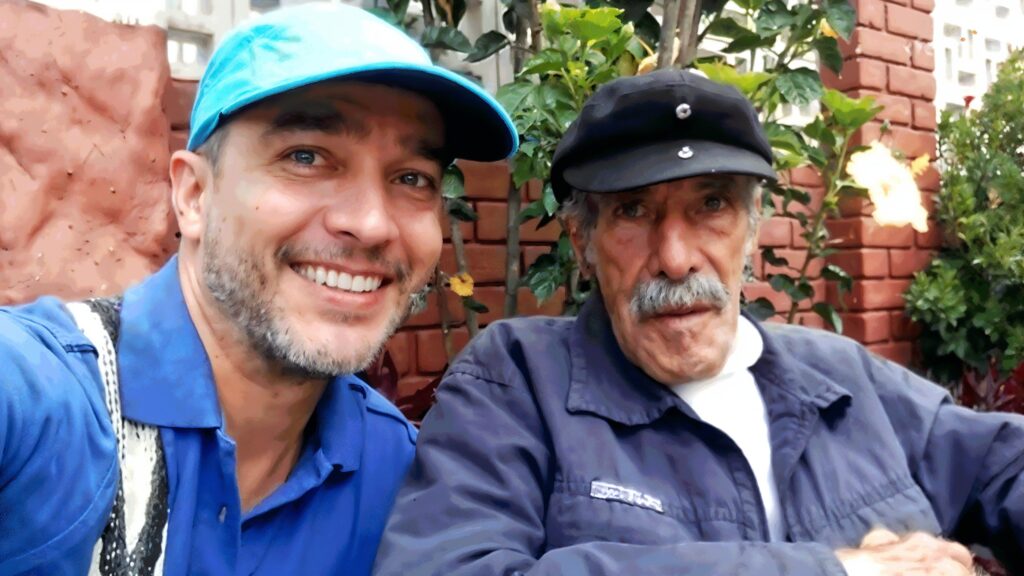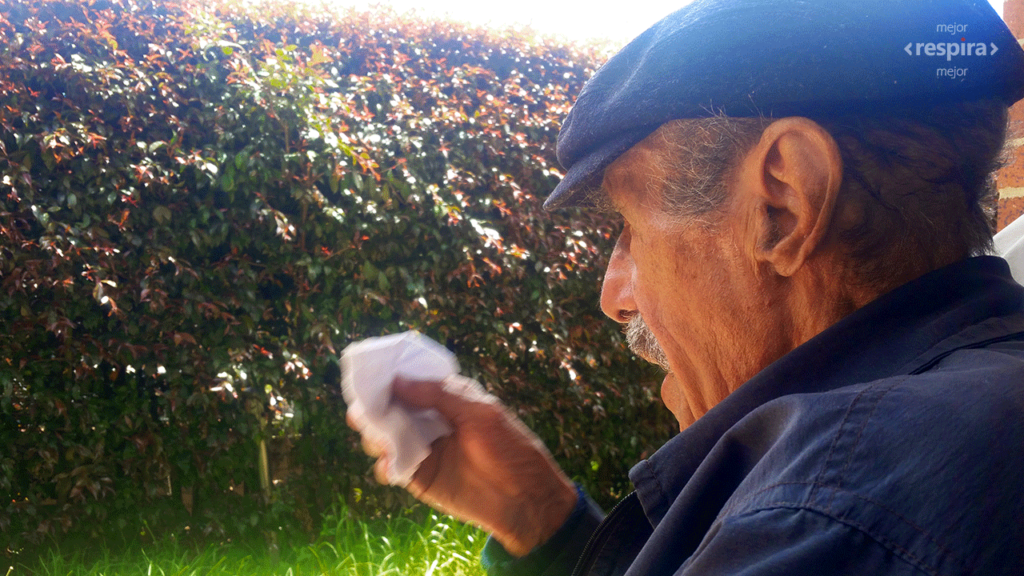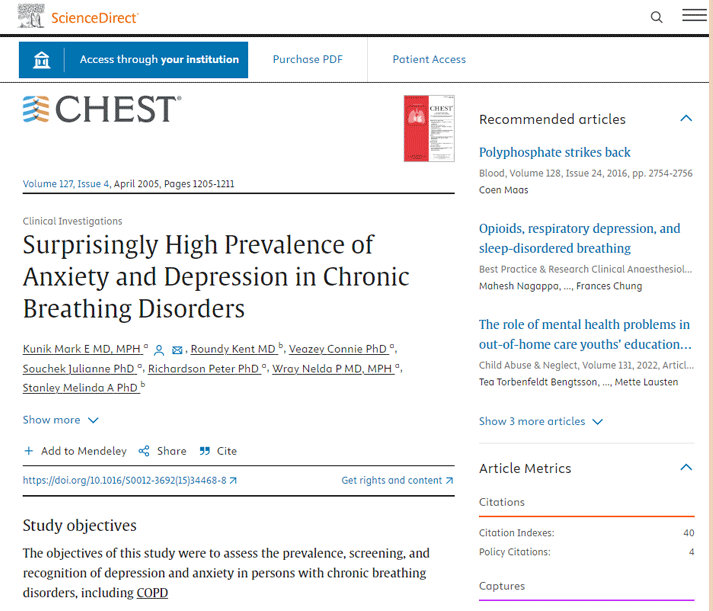Anxiety and depression in Chronic Respiratory Disorders
Approach to Health Prevention
When we see a loved one fighting Chronic obstructive pulmonary disease (COPD), We not only witness the physical challenges they face, but also the profound impact it has on your emotional well-being.

Every breath becomes a daily battle, a silent fight that affects both body and spirit. Beyond the physical symptoms, such as shortness of breath and constant fatigue, he COPD It also steals the joy and vitality of those who suffer from it.. Drive to anxiety and the depression, creating a constant fight against the feeling of suffocation and uncertainty about the future.
In the midst of this difficult reality, it's easy to feel trapped in a negative cycle, where he stress and worry only worsens physical symptoms, while mental anguish makes breathing even more difficult. In this challenging context, The urgent need to address both the physical and mental aspects of chronic respiratory disorders becomes evident.. The goal is to restore the quality of life of those who face this daily battle.
The Deep Relationship between Breathing and Anxiety and Depression
In the context of chronic respiratory disorders, Anxiety and depression are not simple companions of physical symptoms, sino intrinsic components of the individual's experience. Dysfunctional breathing, characterized by lack of adequate oxygenation and compromised breathing patterns, plays a crucial role in the manifestation and exacerbation of these mental disorders.
When the ability to breathe is compromised, either due to obstruction of the airways in cases such as Chronic obstructive pulmonary disease (COPD) or by dysfunctional breathing patterns, the body and mind experience a profound imbalance. Lack of oxygen can trigger a series of physiological responses and emotional, including anxiety and depression.
Chronic stress associated with respiratory disorders not only intensifies physical symptoms, but also exacerbates emotional challenges. Anxiety and depression are not mere emotional responses; They are also the result of a metabolic dysfunction and a nervous system imbalance. These conditions can affect breathing, causing rapid and shallow respiratory responses that worsen hypoxia and respiratory dysfunction, which in turn increases the feeling of shortness of breath and triggers more anxiety.
The negative cycle is further strengthened by the bidirectional relationship between breathing and mental health. Respiratory deficiency and hyperventilation processes generate high energy consumption and high levels of physical stress due to metabolic overdemand.. It is metabolic imbalance adds an additional layer of stress to the body, exacerbating mental symptoms and making recovery even more difficult.
Understanding this interconnection is crucial to effectively address chronic respiratory disorders and improve patients' quality of life.. More than just treating specific symptoms, the approach must be holistic, considering both physical and mental aspects to achieve optimal health.
Functional breathing becomes essential to enhance our health in all its dimensions. Restore breathing not only addresses underlying respiratory problems, but also strengthens our nervous system, balances our metabolic processes and promotes greater mental and emotional clarity. This approach not only relieves the superficial symptoms of anxiety and depression, but also empowers people to approach life with a proactive and positive attitude, strengthening your ability to overcome obstacles and reach your full potential.



“The relationship between dysfunctional breathing and anxiety and depression is complex and multifaceted, exacerbating a cycle that is difficult to break.”
Respiratory Training for Anxiety and Depression
We know the possibilities that respiratory training offers to relieve symptoms of anxiety and depression in people with chronic respiratory disorders. However, It is crucial to understand the high impact that dysfunctional breathing has on our metabolic processes, affecting our health in ways multidimensional.
Developing training programs with people in chronic and advanced states is an delicate task, requiring careful and multidisciplinary considerations. It is not an easy task, Therefore, the main approach should be from preventive health., teaching about the importance of breathing training, beyond providing temporary exercises for anxiety or improving the quality of rest.
The commitment of Better Breathe Better is to transmit the knowledge necessary to raise awareness in our community about the importance of healthy breathing.
Respiratory training not only seeks to restore the functionality of our breathing, but also promotes deep metabolic adjustments that strengthen our body and mind. By improving the efficiency of our respiratory system, we optimize gas exchange in our lungs and increase the delivery of oxygen to our tissues.
These metabolic adjustments make us stronger and more resilient, not only physically, but also mentally and emotionally. When facing stressful situations, our body is better equipped to stay calm and recover quickly, thanks to the optimization of our metabolic processes and the regulation of our nervous system.
By adopting breathing training as part of our lifestyle, We establish a solid foundation for a long-term preventive health. We cultivate a more conscious and harmonious relationship with our breathing, allowing us to face future challenges with confidence and determination.
As a last resort, breathing training goes beyond relieving superficial symptoms of anxiety and depression. Empowers us to approach life with a proactive and positive attitude, strengthening our ability to overcome obstacles and achieve our Maximum potential in all aspects of our life.

The Oxygen Advantage® Method
Like a non-invasive therapeutic alternative, Oxygen Advantage® respiratory training stands out for its comprehensive and effective approach to improving respiratory and mental health. This method goes beyond simple breathing exercises, promoting metabolic adaptations that optimize the body's functioning and strengthen its ability to cope with stressful situations.
One of the key techniques offered by Oxygen Advantage® is the implementation of nostril breathing, level, subtle and diaphragmatic. This practice not only helps filter and heat the air, but also improves oxygen absorption in the lungs, which increases respiratory efficiency and oxygen delivery to tissues. Apnea training is another advanced technique that involves performing breath holding exercises., where you inhale and exhale normally and pause breathing (apnea) during a certain period of time. This type of training can help tone respiratory muscles and improve lung capacity. The body's relaxation response is stimulated, what helps reduce stress and anxiety levels. Besides, sleep apnea promotes metabolic adaptation by increasing tolerance to carbon dioxide, which improves the efficiency of gas exchange in the lungs and increases physical endurance.
Restore functional breathing promotes metabolic adjustments that strengthen our defenses, optimize gas exchange and, but still, tissue oxygenation, muscles and organs in general. Strengthening respiratory muscles improves lung capacity and physical endurance, thus contributing to a higher level of energy and vitality. Optimal oxygenation of the brain results in a significant improvement in mental clarity, focus ability, mental performance and emotional response. He nervous system balance, As a result of this approach, contributes to the optimal regulation of circadian cycles, essential to maintain healthy biological rhythms, such as sleep and hormone release. Besides, la homeostasis, maintained thanks to these cycles, ensures that the body's internal conditions remain stable, promoting optimal cellular and systemic functioning.
In summary, The Oxygen Advantage® Method offers a powerful tool to improve integral Health. By teaching people to breathe more efficiently and consciously, This approach not only relieves symptoms of anxiety and depression, It also strengthens the body and mind to face life's challenges with greater confidence and determination..
Conclusion
- Addressing anxiety and depression in the context of chronic respiratory disorders requires a holistic approach that considers both physical and mental health.
- Treatment of chronic respiratory diseases is difficult and delicate. Especially in advanced stages where obtaining physical improvements, beyond emotional help, it becomes almost impossible.
- Restoration of functional breathing becomes essential as an integral part of a culture of preventive health focus on education, from an early age, of the importance of healthy breathing.
- Restore functional breathing strengthens our nervous system, balances our metabolic processes and promotes greater mental and emotional clarity.
- By understanding and cultivating our respiratory capacity, we become architects of our own well-being, strengthening both body and mind.
- Conscious connection with our breath allows us activate and develop metabolic processes that elevate our physical condition, mental and emotional.
- The first step that every human being should take towards preventive health, It's of recover healthy breathing.
“Are you interested in developing practices or acquiring healthy habits to implement preventive health routines in your life?? Would you like to explore the therapeutic potential of breathing training and restore your functional breathing??
Let's start by evaluating your current breathing and designing a personalized training program that suits your needs and goals..
Contact us to start this stage towards better comprehensive health!
THE SCIENCE OF BREATH
Below I leave at your disposal the link that served as a reference for this publication:
Kunik Mark E MD, MPH, Roundy Kent MD, Veazey Connie PhD, Souchek Julianne PhD, Richardson Peter PhD, Wray Nelda P MD, MPH, Stanley Melinda A PhD.

categories
Recent posts
-
 The Impact of Respiratory Training: On Health and Daily PerformanceOctober 3, 2024/0 Comments
The Impact of Respiratory Training: On Health and Daily PerformanceOctober 3, 2024/0 Comments -
 LSD Breathing: Science and SuperpowerSeptember 13, 2024/
LSD Breathing: Science and SuperpowerSeptember 13, 2024/ -

-

Follow us on LinkedIn
By robledo 2024
Build in WordPress® con Elementor® and Oceanwp®
Certified Instructor of Oxygen Advantage®

